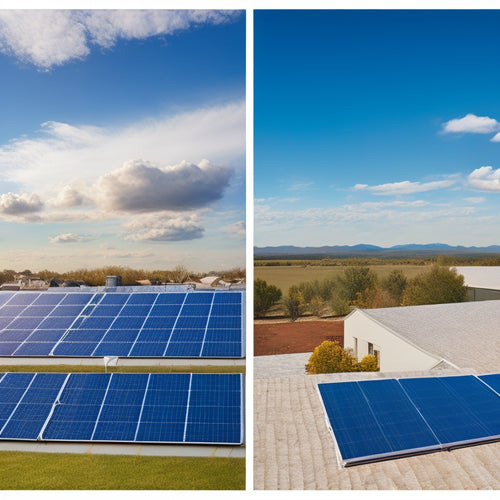
5 Things to Know About the Average Cost of Solar Battery
Share
You're likely to spend between $10,000 and $20,000 or more on a solar battery system, depending on your specific energy needs and the type of battery you choose. The cost varies based on factors like battery quality, brand, and lifespan, with longer-lasting batteries often having higher upfront costs. Installation costs, including labor and hardware expenses, also impact the overall price. Evaluating your energy needs is essential to selecting the right battery, and understanding pricing factors can help you meet your budget and energy requirements. As you investigate your options, you'll uncover more about what affects the cost and how to make an informed investment.
Key Takeaways
- The average cost of a solar battery system ranges from $8,000 to $12,000, depending on the type and quality of the battery.
- Installation costs, including labor and permitting, add $2,000 to $4,000 to the overall expense.
- Longer-lasting batteries may have higher upfront costs, but they can provide lower long-term expenses and better value.
- Government incentives, such as tax credits, can reduce the overall cost of a solar battery system.
- The cost of a solar battery system varies based on specific energy needs, geographical location, and brand selection.
Understanding Solar Battery Pricing
When shopping for a solar battery, you'll likely encounter a wide range of prices, making it vital to understand the factors that influence solar battery pricing. As you investigate different options, you'll notice that prices vary greatly depending on the type, quality, and brand of the battery.
A key aspect to contemplate is the solar battery lifespan, which can greatly impact the overall cost. A longer-lasting battery may be more expensive upfront but can provide better value in the long run.
Additionally, installation costs play a major role in the total price. These costs can include labor, hardware, and software expenses, which can add up quickly.
It's vital to assess your specific energy needs and requirements when selecting a solar battery. By understanding the key factors that influence pricing, you can make an informed decision that meets your needs and budget.
Factors Affecting Solar Battery Cost
Your energy storage needs play a significant role in determining the overall cost of a solar battery. The amount of energy you want to store and the type of battery you choose will impact the final cost.
Battery lifespan is another vital factor, as a longer-lasting battery will generally cost more upfront but save you money in the long run.
Energy capacity is also a key consideration, as a larger capacity battery will be more expensive. Maintenance expenses should also be factored in, as some batteries require more upkeep than others.
Government incentives, such as tax credits, can help offset the cost of a solar battery, so it's important to research what's available in your area.
Market trends and technological advancements can also impact the cost of a solar battery. As technology improves, prices tend to decrease, making solar batteries more accessible.
Brand reputation is also important, as a reputable brand may charge more for their product, but it's often worth the investment.
Cost Breakdown of Solar Battery
Concerning the overall cost, a solar battery can be broken down into several key components. These components contribute to the total cost, and understanding each aspect can help you make an informed decision.
Here is a breakdown of the typical costs associated with a solar battery:
| Component | Cost Range |
|---|---|
| Hardware (battery, inverter, etc.) | $8,000 - $12,000 |
| Installation Expenses (labor, permitting) | $2,000 - $4,000 |
| Maintenance Costs (monitoring, replacement) | $500 - $1,000 |
As you can see, the hardware cost makes up the bulk of the total cost, followed by installation expenses. Maintenance costs, although smaller, are still an essential consideration. Keep in mind that these costs can vary depending on your specific needs and location. By understanding these components, you can better plan your solar battery investment and make the most of your renewable energy solution.
Comparing Solar Battery Brands
Comparing solar battery brands requires careful consideration of several factors, including performance, warranty, and price. You want to guarantee that the brand you choose meets your energy needs and provides a reliable backup power source.
When evaluating brand performance, consider the energy capacity of the battery and its ability to charge and discharge efficiently. Warranty options are also vital, as they can provide peace of mind and protect your investment.
When making brand comparisons, look at installation costs, as they can vary greatly between brands. Additionally, research customer reviews to get a sense of the brand's reputation and customer satisfaction.
Some popular solar battery brands include Tesla, LG, and Sonnen. Each brand has its strengths and weaknesses, so it's important to weigh the pros and cons before making a decision.
Future of Solar Battery Pricing
The solar industry's rapid growth has led to a significant decline in solar battery pricing over the years, making clean energy more accessible to homeowners and businesses.
You're likely wondering what the future holds for solar battery pricing. As emerging technologies continue to advance, you can expect prices to drop even further. Market trends suggest that economies of scale will play a significant role in driving down costs as the demand for solar batteries increases.
You'll benefit from the ongoing research and development in areas like energy storage and grid integration. These advancements will lead to more efficient and cost-effective solutions, ultimately reducing the average cost of solar batteries.
Additionally, government incentives and policies aimed at promoting renewable energy adoption will also contribute to more affordable solar battery options.
As you consider investing in a solar battery system, keep an eye on the market trends and emerging technologies. You'll be able to take advantage of the decreasing prices and increasing efficiency, making clean energy a more viable option for your home or business.
Frequently Asked Questions
Can I Use a Solar Battery With a Non-Solar Power System?
You can integrate a solar battery with a non-solar power system, but you'll need to verify solar battery compatibility and consider non-solar integration requirements, such as compatible voltage and frequency, to guarantee seamless operation.
How Long Does It Take to Install a Solar Battery System?
You'll typically spend 1-3 days on installation, depending on the complexity of your system and battery compatibility, ensuring a seamless integration with your existing power setup.
Are Solar Batteries Eligible for Federal Tax Credits?
You're wondering if solar batteries are eligible for federal tax credits? Yes, you're in luck! Solar batteries qualify for the Solar Investment Tax Credit (ITC), offering a 26% tax credit on your total system cost, making solar incentives more accessible and affordable for you.
Can I Oversize My Solar Battery for Future Energy Needs?
You plan ahead, thinking about battery sizing for future energy needs. Yes, you can oversize your solar battery, ensuring you're prepared for increased energy demands or adding more solar panels down the line.
Do Solar Batteries Have a Warranty or Guarantee?
You'll be glad to know that solar batteries typically come with a warranty, usually ranging from 5 to 15 years, which covers defects and performance issues, and often includes a performance guarantee that guarantees the battery maintains a certain capacity over its warranty duration.
Conclusion
As you weigh the pros and cons of solar batteries, remember that the upfront cost is just the beginning. On one hand, the initial investment may seem intimidating, but on the other hand, think of the long-term savings and the freedom from relying on the grid. With prices dropping and technology advancing, the future of solar battery pricing looks bright - and so does your potential for energy independence.
Related Posts
-

Top Portable Solar Panels for Cars to Buy Online
When shopping for portable solar panels for your car, you'll want to take into account reputable brands like Renogy, ...
-

Why Invest in Residential Solar Panel Systems?
By investing in a residential solar panel system, you'll harness renewable energy, reducing your carbon footprint and...
-

Tracking Solar Panels Vs Fixed Panels Cost Savings
When considering solar panel options, you'll want to weigh the cost savings of tracking solar panels versus fixed pan...


